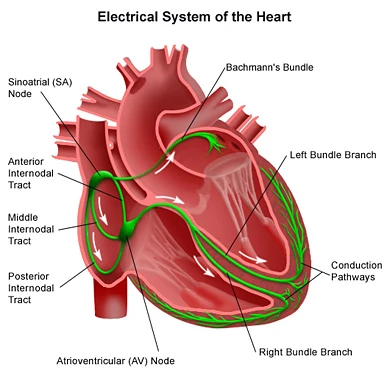Arrhythmia is a general term that refers to an irregular heart rate or rhythm. Various factors, including structural heart disease, electrolyte imbalances, and certain medications, can cause it. An arrhythmia can cause shortness of breath, chest pain, fatigue, dizziness, and cardiac arrest.
If left untreated, arrhythmias can increase the risk of stroke and other cardiovascular-related complications. Patients need to recognize the signs and symptoms of arrhythmia to seek medical attention to prevent further health issues.

Arrhythmia Causes
Various factors, including medical conditions, lifestyle choices, and genetic predispositions, can cause arrhythmias.
Medical conditions such as heart disease, high blood pressure, diabetes, and kidney disease can all contribute to arrhythmia.
Certain medications like antiarrhythmic drugs or chemotherapy treatments may also cause arrhythmias.
Lifestyle choices like smoking and drinking alcohol excessively can increase the risk of developing an arrhythmia.
& Finally, certain genetic abnormalities that affect the heart's electrical conduction system may put individuals at increased risk for developing arrhythmia.
Individuals must understand their risk factors for arrhythmia to take proper precautions to protect their health.
Arrhythmia Diagnosis
Arrhythmia is typically diagnosed through physical exams, medical history and diagnostic tests.
During a physical exam, a doctor may check for symptoms such as palpitations (heartbeat irregularities) or shortness of breath. They may also take the patient's blood pressure or listen to their heartbeat to detect irregularities.
A patient's medical history can provide valuable insight into their personal risk factors for arrhythmia. Diagnostic tests such as an electrocardiogram (ECG), Holter monitor, and event monitor are usually used to evaluate potential abnormal heart rhythms.
An ECG is used to measure the electrical activity of the heart. At the same time, Holter monitors are worn during normal activities over a prolonged time to detect arrhythmias that might not be present when examined in the doctor's office.
Event monitors allow patients to record their heart rhythm whenever they feel something unusual, helping the doctor become aware of irregular heartbeats that only occur periodically.
Arrhythmia Treatment
Arrhythmia can be treated with various methods, including medications, cardioversion, catheter ablation, and pacemakers.
Medications such as beta-blockers and calcium channel blockers help control the heart rate and reduce the risk of arrhythmias.
Cardioversion is when an electric shock is applied to the heart to restore normal electrical activity.
Catheter ablation is a minimally-invasive technique that uses heat or cold energy to destroy abnormal tissue responsible for causing arrhythmias.
Lastly, pacemakers are used to control slow heart rates or prevent fast heart rhythms by delivering electrical pulses to the heart muscle regularly.
Prevention
It is important to maintain a healthy weight and exercise regularly to prevent arrhythmia. Eating a balanced diet with plenty of fruits, vegetables, and whole grains can also be beneficial. Limiting your consumption of alcohol and caffeine can also reduce the risk of developing an abnormal heart rhythm.
Additionally, it is important to see your doctor for regular check-ups to ensure that any underlying medical conditions are managed properly so that any potential signs or symptoms of arrhythmia are caught early.
In conclusion, arrhythmias can be managed and prevented through lifestyle changes, medications and procedures. If you experience any symptoms of an abnormal heart rhythm, such as palpitations, shortness of breath or chest pain, it is important to contact your healthcare provider for further assessment. For more information or to schedule an appointment, please get in touch with our clinic at +91 9130058897 / +91 8208196544.


